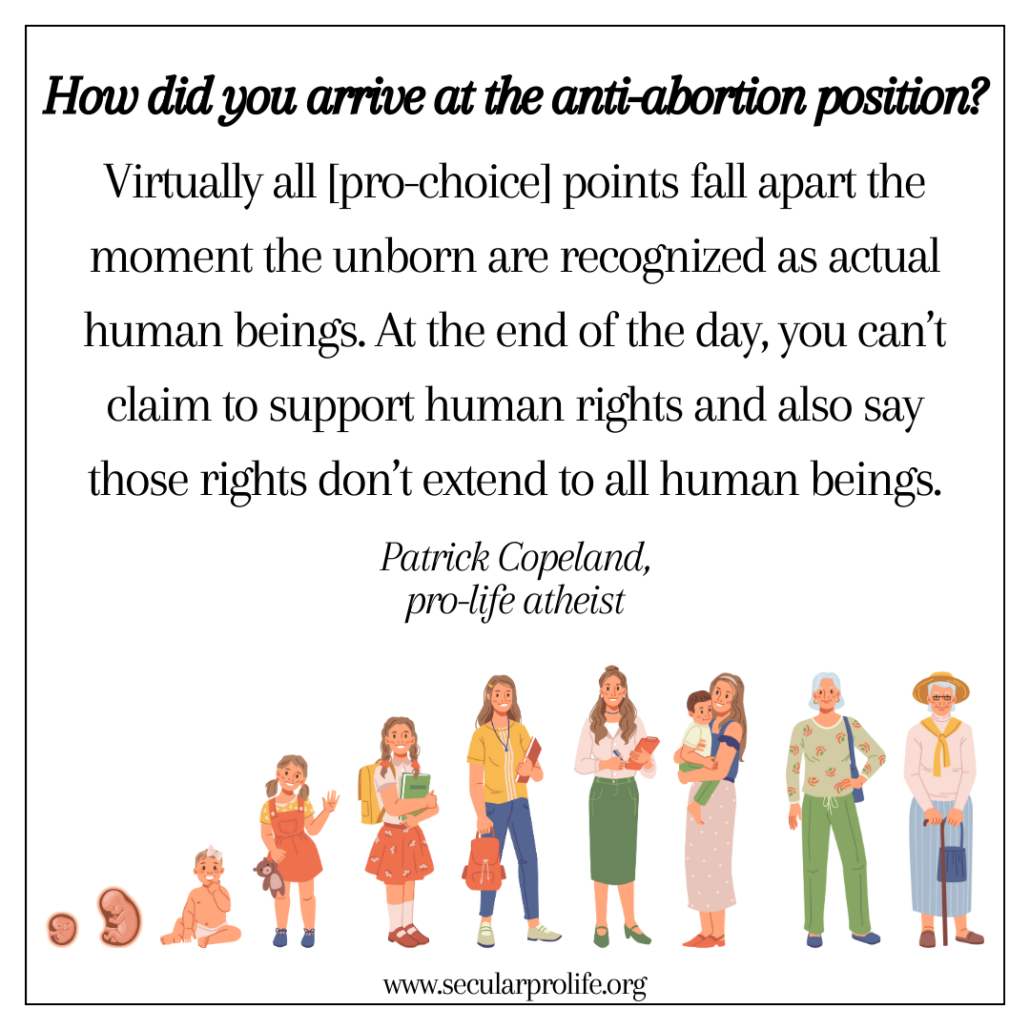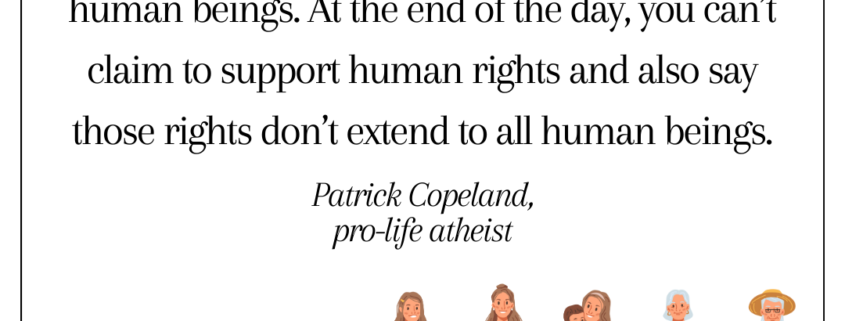Ask a Pro-Life Atheist: Patrick Copeland
Once a month or so, the Secular Pro-Life blog features a short interview with a pro-life atheist. (See the full series of interviews here.) Although Secular Pro-Life is not exclusively for atheists, historically atheists have played a key role in the organization. As atheists become more prominent in the pro-life movement generally, we’re excited for the opportunity to share their stories. This month, we welcome agnostic atheist and attorney Patrick Copeland.
How did you arrive at the anti-abortion position?
Growing up in a conservative moderately religious household, I was raised to generally be pro-life and oppose abortion. However, in high school, a friend confronted me, painted a terrifying hypothetical where my sister (who was 10 at the time) had been kidnapped, sexually assaulted, and impregnated, and then asked me if I could justify sitting my sister down and telling her she had to carry her attacker’s baby to term and deliver it. I couldn’t. In that moment, I started down the road of becoming more and more pro-choice.
I reached the peak of the path in college, and on certain days you could find me debating pro-life demonstrators that would come to campus. I remember arguing that there was no way around the inherently parasitic relationship between the unborn and the mother, or that denying a woman the ability to have an abortion was unjustifiably forcing her to be subject to this harmful relationship.
Then I got my first small wake up call. During one of my debates with another guy from one of these pro-life groups, a pro-abortion group tried to forcefully shout down our discussion. They called me “part of the problem” because I was a man talking about abortion. Apparently, it didn’t matter to them that I agreed with their stance and was on their side. This didn’t convert me to the pro-life side by any means, but it left me confused and frustrated.
This confusion and frustration slowly but surely started opening my eyes to some of the concerning behavior and faulty arguments coming from “my” side, the pro-choice side. I started noticing that pro-choice advocates would make claims that the unborn were “literally parasites” or that they otherwise weren’t human at all. I remember thinking “..that’s just scientifically false. Why are they resorting to arguments that outright reject basic biology? That’s so unnecessary.” Over time, I started noticing more falsehoods coming from the pro-choice side, each one making it harder justify my pro-choice position.
Eventually, it became clear why the pro-choice side perpetuated falsehoods and obfuscated the humanity of the unborn: because virtually all of their points fall apart the moment the unborn are recognized as actual human beings, particularly for those who claim to champion human rights. At the end of the day, you can’t claim to support human rights and also say those rights don’t extend to all human beings. Ultimately, my transition to the pro-life side came after arriving at the conclusion that I do believe in basic human rights—the primary right necessarily being the right to life—and that those rights extend to all human beings, particularly the most vulnerable and innocent among us: the unborn.

How did you arrive at the atheist position?
I grew up in a conservative Christian household. Went to church every Sunday, church camp for a couple summers, and even went to a Baptist university for two years where I was required to formally study the Bible and how to properly interpret it. However, during high school and college, I was also coming to terms with something horribly inconvenient to my faith: I am gay.
I was able to reconcile my faith with my sexuality (largely due to the research of Matthew Vines—author of “God and the Gay Christian”), but not without developing a habit for researching scripture and thoroughly scrutinizing its passages. The more I read and researched the scriptures on my own, the more disconnects and inconsistencies I found that caused me to doubt. Around the same time, I also encountered atheists who poked more holes in my already crumbling faith. I reached out to a preacher I was friends with hoping he could offer a solid rebuttal to these atheists arguments and help revitalize my faith. I got no response. Radio silence.
In hindsight, this silence did wonders for me. I stopped shying away from the inconsistencies I noticed in the scriptures and, frankly, the atrocities that ran rampant in the Bible. The flood, the Midianites, the plagues in Egypt, the torture of Job, the children killed by bears sent by God, the list went on and on. I am convinced there is other content in the Bible that debunks the notion of an all-loving, timeless, spaceless tri-omni deity, but what ultimately led me to leave Christianity and adopt agnosticism were, specifically, the violent and murderous atrocities in the Bible either condoned, commanded, or outright committed directly by god.
How do you contribute to the cause of saving lives in the womb?
While I am passionate about advocating for the unborn, my contributions feel far more limited than I would like. I certainly talk with as many people as I can to help change hearts and minds on the ground.
More recently, however, I’ve sought to get involved with pro-life groups to do more. I initially reached out to ADF (Alliance Defending Freedom) to volunteer my services as an attorney to help fight legal battles at the state level against abortion. However, their volunteer applications require attesting to certain beliefs, religious and otherwise, I could not attest to in good faith. Discouraged, I sought out other pro-life groups and was able to find Secular Pro-Life. I submitted an application several weeks back. I’ve since been fortunate enough to work with individuals like Monica and Kelsey to help give legal analyses on current controversies and work on other projects to otherwise help Secular Pro-Life’s cause.
What words of wisdom do you have to share?
If you’re a pro-life atheist or agnostic, you’re likely no stranger to feeling out of place in a lot of spaces. Not being religious enough for most pro-life people and not pro-choice enough for most other non-theists. It can be draining and even disheartening at times, but there are a couple things I do to help myself out:
- Develop friendships with at least a few other similar minded pro-life agnostics/atheists if you haven’t already. While none of us should lock ourselves into an echo chamber, it’s healthy (and sometimes crucial) to have a group of friends that can offer a safe haven and some reprieve.
- If you often find yourself in spaces where you think you might need to defend your views, you might want to keep a list of sources handy that you find compelling. Secular Pro-Life actually already has an index of popular pro-abortion arguments and counterpoints that serves as a great resource and example of what I’m talking about. This can take the pressure off of having to remember a massive amount of information, and can give you an easy way to “bring the receipts” so to speak.
- And while it’s absolutely fantastic to be passionate about the issue of abortion, don’t let it edge out other important aspects of and people in your life. Enjoy your hobbies, grow your relationships with friends and family, both old and new, and check yourself every so often to make sure you’re keeping yourself balanced.



